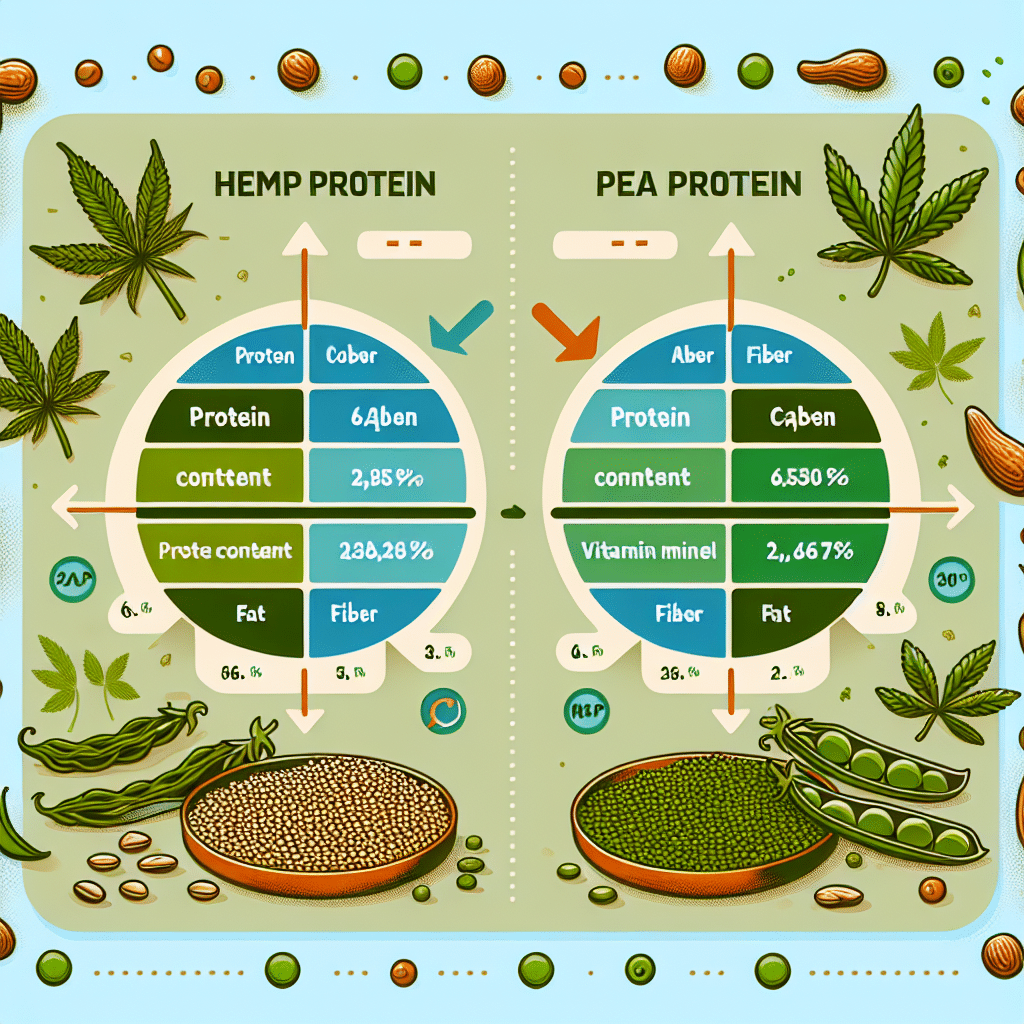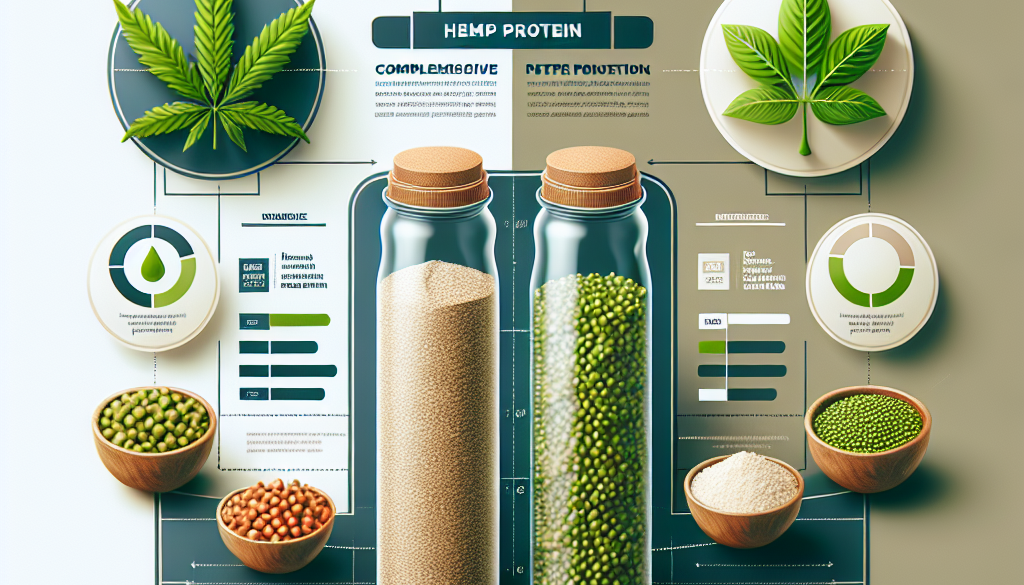Hemp vs Pea Protein: A Comprehensive Comparison
-
Table of Contents
- Hemp vs Pea Protein: A Detailed Nutritional Face-Off
- Understanding Hemp Protein
- Understanding Pea Protein
- Nutritional Comparison
- Health Benefits and Potential Drawbacks
- Health Benefits of Hemp Protein
- Potential Drawbacks of Hemp Protein
- Health Benefits of Pea Protein
- Potential Drawbacks of Pea Protein
- Environmental Impact and Sustainability
- Choosing the Right Protein for You
- Conclusion
- Discover ETprotein’s Premium Plant Proteins
Hemp vs Pea Protein: A Detailed Nutritional Face-Off

As the demand for plant-based proteins continues to rise, consumers are often faced with the challenge of choosing the best source that aligns with their dietary needs and ethical preferences. Among the plethora of options, hemp and pea proteins stand out as two of the most popular and nutritious plant-based proteins available. This comprehensive comparison will delve into the nutritional profiles, benefits, and potential drawbacks of hemp and pea protein, helping you make an informed decision about which protein is right for you.
Understanding Hemp Protein
Hemp protein is derived from the seeds of the Cannabis sativa plant. Despite its association with marijuana, hemp seeds contain only trace amounts of THC, the psychoactive compound, and are safe and legal to consume. Hemp protein is known for its earthy taste and is often praised for its nutritional completeness.
- Rich in Essential Amino Acids: Hemp protein contains all nine essential amino acids, making it a complete protein.
- High in Fiber: Hemp seeds provide a good source of dietary fiber, which is beneficial for digestive health.
- Omega Fatty Acids: Hemp protein includes a balanced ratio of omega-3 to omega-6 fatty acids, which are crucial for heart health.
- Minerals and Antioxidants: It is also a good source of minerals like magnesium, iron, and zinc, as well as antioxidants.
Understanding Pea Protein
Pea protein is extracted from yellow split peas and has gained popularity due to its high protein content and hypoallergenic properties. It is a favorite among athletes and those looking to build muscle mass.
- High Protein Content: Pea protein is typically higher in protein per serving compared to hemp protein.
- Rich in Iron: It is an excellent source of iron, which is often a concern for those following a plant-based diet.
- Low in Allergens: Pea protein is naturally gluten-free and does not contain common allergens found in soy or dairy proteins.
- Branch Chain Amino Acids (BCAAs): It is particularly high in arginine, lysine, and phenylalanine, which are beneficial for muscle growth and recovery.
Nutritional Comparison
When comparing hemp and pea protein, it’s important to consider your personal health goals. Here’s a breakdown of their nutritional content per typical serving size:
- Protein Content: Pea protein often contains more protein per serving than hemp protein.
- Fiber: Hemp protein usually has more fiber, aiding in digestion and satiety.
- Fat Content: Hemp protein has a higher fat content, but these are primarily healthy fats, including omega-3 and omega-6 fatty acids.
- Carbohydrates: Hemp protein may have more carbohydrates due to its higher fiber content.
- Minerals: Both proteins offer a range of minerals, but pea protein is particularly high in iron.
Health Benefits and Potential Drawbacks
Both hemp and pea protein offer unique health benefits, but they also have potential drawbacks that should be considered.
Health Benefits of Hemp Protein
- Complete Protein: Supports muscle repair and growth.
- Heart Health: Omega fatty acids may reduce the risk of heart disease.
- Digestive Health: High fiber content promotes a healthy gut.
Potential Drawbacks of Hemp Protein
- Lower Protein Density: May require larger servings to meet protein needs.
- Taste and Texture: Some may find the earthy taste and gritty texture unappealing.
Health Benefits of Pea Protein
- Muscle Growth: Rich in BCAAs, which are essential for building muscle.
- Hypoallergenic: A safe option for those with allergies to dairy, soy, or gluten.
- Iron-Rich: Helps prevent iron deficiency, especially in vegans and vegetarians.
Potential Drawbacks of Pea Protein
- Sodium Content: Some pea protein powders may have added sodium.
- Incomplete Protein: While high in many amino acids, pea protein is lower in methionine.
Environmental Impact and Sustainability
For environmentally conscious consumers, the sustainability of their protein sources is a significant factor. Hemp is known for its low environmental impact, as it requires little water and no pesticides to grow. It also replenishes soil health. Pea protein also has a relatively low environmental footprint, especially when compared to animal-based proteins, and is considered a sustainable crop due to its nitrogen-fixing properties that benefit soil health.
Choosing the Right Protein for You
When deciding between hemp and pea protein, consider your dietary needs, taste preferences, and environmental values. If you’re looking for a complete protein with additional fiber and healthy fats, hemp protein may be the way to go. On the other hand, if you’re focused on muscle building and need a higher protein content with a smoother texture, pea protein could be more suitable.
Conclusion
In conclusion, both hemp and pea proteins offer unique benefits and can be excellent additions to a balanced diet. Hemp protein stands out for its complete amino acid profile and additional health benefits from fiber and healthy fats, while pea protein shines with its high protein content and muscle-building amino acids. Ultimately, the choice between hemp and pea protein should be based on your individual health goals, dietary restrictions, and taste preferences.
Discover ETprotein’s Premium Plant Proteins
If you’re looking to incorporate high-quality plant-based proteins into your diet, ETprotein offers a range of exceptional products. Their commitment to non-GMO, allergen-free, and organic ingredients ensures that you’re getting the best nutrition without compromise. Whether you’re in the food and beverage industry or seeking personal health supplements, ETprotein’s diverse product line, including organic rice protein, pea protein, and other plant-based options, caters to all your protein needs.
About ETprotein:
ETprotein, a reputable plant protein vegan protein Chinese factory manufacturer and supplier, is renowned for producing, stocking, exporting, and delivering the highest quality organic bulk vegan protein and plant proteins. They include Organic rice protein, clear rice protein, pea protein, clear pea protein, watermelon seed protein, pumpkin seed protein, sunflower seed protein, mung bean protein, peanut protein etc. Their offerings, characterized by a neutral taste, non-GMO, allergen-free attributes, cater to a diverse range of industries. They serve nutraceutical, pharmaceutical, cosmeceutical, veterinary, as well as food and beverage finished product distributors, traders, and manufacturers across Europe, USA, Canada, Australia, Thailand, Japan, Korea, Brazil, and Chile, among others.
ETprotein specialization includes exporting and delivering tailor-made protein powder and finished nutritional supplements. Their extensive product range covers sectors like Food and Beverage, Sports Nutrition, Weight Management, Dietary Supplements, Health and Wellness Products, and Infant Formula, ensuring comprehensive solutions to meet all your protein needs.
As a trusted company by leading global food and beverage brands and Fortune 500 companies, ETprotein reinforces China’s reputation in the global arena. For more information or to sample their products, please contact them and email sales(at)ETprotein.com today.












